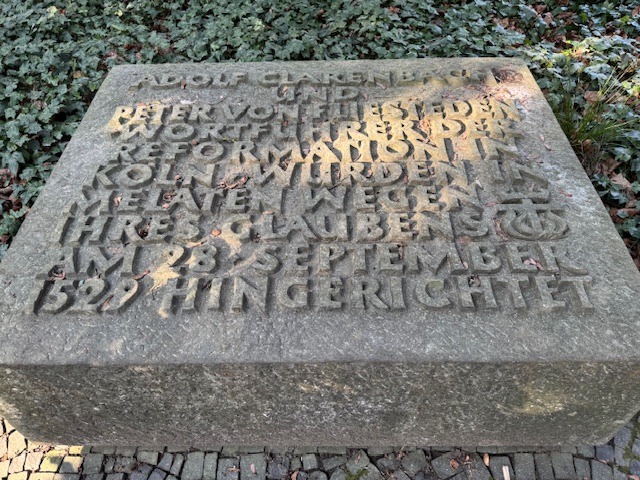Early Life and Reformist Activities
Adolf Clarenbach was born around 1497 on the “Buscherhof” estate near Lüttringhausen in the Duchy of Berg. He studied at the University of Cologne, earning his Master’s degree in 1517.
As a teacher and vice-principal in Münster and Wesel, he began spreading Martin Luther’s teachings, bringing him into conflict with Catholic authorities.
He advocated for the removal of religious icons from churches and publicly promoted Reformation ideas, leading to his expulsion from multiple cities.
Persecution and Imprisonment
In 1528, Clarenbach was arrested in Cologne after accompanying his friend Johann Klopreis to an ecclesiastical court. While Klopreis managed to escape, Clarenbach remained in custody. He was charged with heresy and imprisoned for over 18 months.
During this time, he was interrogated and tortured but remained steadfast in his beliefs. He argued that only Christ’s death could atone for human sin and continued to reject the authority of the Catholic Church.
Execution and Last Words
On 28 September 1529, Clarenbach was burned at the stake in Cologne at the Rabenstein (Melaten), alongside Peter Fliesteden. His final words were said to be:
“Even if you have killed me, you will not have your way—but I will have eternal life. So this death does not frighten me, for I know that Christ has overcome death, the devil, and hell.”
This statement reflects his unshakable faith and his conviction that his death was a testimony to the truth.
Political and Religious Context of Persecution
Clarenbach’s persecution was driven by both political and religious motives. The Catholic Church and secular rulers—including Duke Johann III of Jülich-Cleves-Berg—saw the spread of Reformation ideas as a threat to their authority.
The collaboration between church and state led to dissenters and Protestants like Clarenbach being branded as heretics, persecuted, and executed. His execution was an attempt to suppress the Reformation’s spread in the Rhineland.
Legacy and Commemoration
Clarenbach is remembered as one of the first Protestant martyrs in the Lower Rhine region. In 1829, 300 years after his death, a monument was erected in his honor in Lüttringhausen, and his name was immortalized in Cologne through streets, schools, and churches. (The author of this article lives near the Clarenbachkanal in Cologne.)
His story serves as a reminder of the sacrifices made for religious freedom and reform, standing as a symbol of resistance against oppression.
Memorial Stone at Cologne’s Melaten Cemetery

Image: Memorial stone for Adolf Clarenbach and Peter Fliesteden at Melaten Cemetery, Cologne. Source: Own photo